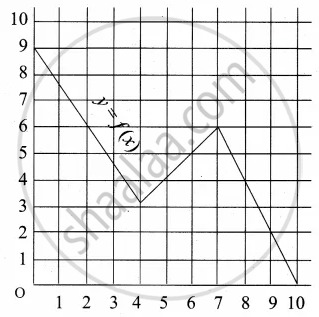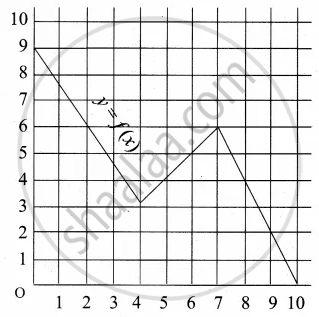Advertisements
Advertisements
Question
Answer the following:
If `log (("a" + "b")/2) = 1/2(log"a" + log"b")`, then show that a = b
Solution
`log (("a" + "b")/2) = 1/2(log"a" + log"b")`
∴ `2 log (("a" + "b")/2)` = log a + log b
∴ `log (("a" + "b")/2)^2` = log ab
∴ `("a" + "b")^2/4` = ab
∴ a2 + 2ab + b2 = 4ab
∴ a2 + 2ab – 4ab + b2 = 0
∴ a2 – 2ab + b2 = 0
∴ (a – b)2 = 0
∴ a – b = 0
∴ a = b
APPEARS IN
RELATED QUESTIONS
Let f : R+ → R, where R+ is the set of all positive real numbers, such that f(x) = loge x. Determine
(c) whether f(xy) = f(x) : f(y) holds
f, g, h are three function defined from R to R as follow:
(i) f(x) = x2
Find the range of function.
Let X = {1, 2, 3, 4} and Y = {1, 5, 9, 11, 15, 16}
Determine which of the set are functions from X to Y.
(c) f3 = {(1, 5), (2, 9), (3, 1), (4, 5), (2, 11)}
If f(x) = x2, find \[\frac{f\left( 1 . 1 \right) - f\left( 1 \right)}{\left( 1 . 1 \right) - 1}\]
If \[y = f\left( x \right) = \frac{ax - b}{bx - a}\] , show that x = f(y).
If f(x) = loge (1 − x) and g(x) = [x], then determine function:
(i) f + g
If f(x) = cos [π2]x + cos [−π2] x, where [x] denotes the greatest integer less than or equal to x, then write the value of f(π).
Let \[f\left( x \right) = \frac{\alpha x}{x + 1}, x \neq - 1\] . Then write the value of α satisfying f(f(x)) = x for all x ≠ −1.
If\[f\left( x \right) = 1 - \frac{1}{x}\] , then write the value of \[f\left( f\left( \frac{1}{x} \right) \right)\]
Let f(x) = |x − 1|. Then,
If x ≠ 1 and \[f\left( x \right) = \frac{x + 1}{x - 1}\] is a real function, then f(f(f(2))) is
If f : R → R and g : R → R are defined by f(x) = 2x + 3 and g(x) = x2 + 7, then the values of x such that g(f(x)) = 8 are
If f(m) = m2 − 3m + 1, find f(0)
Find the domain and range of the following function.
g(x) = `(x + 4)/(x - 2)`
Find the domain and range of the following function.
f(x) = `sqrt((x - 2)(5 - x)`
Check the injectivity and surjectivity of the following function.
f : R → R given by f(x) = x3
Show that if f : A → B and g : B → C are one-one, then g ° f is also one-one
Express the following logarithmic equation in exponential form
log2 64 = 6
Write the following expression as sum or difference of logarithm
`log ("pq"/"rs")`
Solve for x.
log2 x + log4 x + log16 x = `21/4`
If `log((x + y)/3) = 1/2 log x + 1/2 logy`, show that `x/y + y/x` = 7
If f(x) = 3x + 5, g(x) = 6x − 1, then find `("f"/"g") (x)` and its domain
A function f is defined as : f(x) = 5 – x for 0 ≤ x ≤ 4. Find the value of x such that f(x) = 3
Answer the following:
If f(x) = 3x + a and f(1) = 7 find a and f(4)
Answer the following:
Let f : R → R be given by f(x) = x + 5 for all x ∈ R. Draw its graph
Answer the following:
Show that, `log ("a"^2/"bc") + log ("b"^2/"ca") + log ("c"^2/"ab")` = 0
Answer the following:
If `log ((x - y)/5) = 1/2 logx + 1/2 log y`, show that x2 + y2 = 27xy
Answer the following:
Show that `7log (15/16) + 6log(8/3) + 5log (2/5) + log(32/25)` = log 3
Answer the following:
Find the domain of the following function.
f(x) = `sqrt(x - x^2) + sqrt(5 - x)`
A graph representing the function f(x) is given in it is clear that f(9) = 2

For what value of x is f(x) = 1?
A graph representing the function f(x) is given in it is clear that f(9) = 2

Describe the following Range
The range of 7, 11, 16, 27, 31, 33, 42, 49 is ______.
Find the domain of the following function.
f(x) = `x/(x^2 + 3x + 2)`
If f(x) = `(x - 1)/(x + 1)`, then show that `f(1/x)` = – f(x)
Let f(x) = `sqrt(x)` and g(x) = x be two functions defined in the domain R+ ∪ {0}. Find (f + g)(x)
The domain of the function f(x) = `1/sqrt(|x| - x)` is ______.
The function f: R `rightarrow` R defined by f(x) = sin x is ______.
The period of the function
f(x) = `(sin 8x cos x - sin 6x cos 3x)/(cos 2x cos x - sin 3x sin 4x)` is ______.
